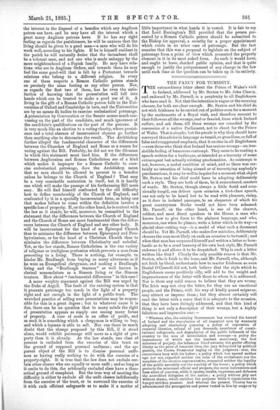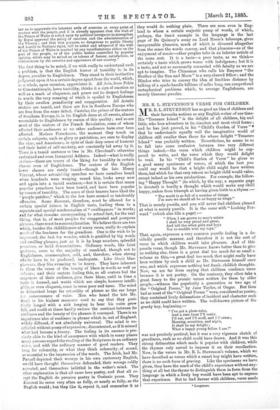THE FANCY FOR TUMIDITY.
THE extraordinary letter about the Prince of Wales's visit to Ireland, addressed by Mr. Sexton to Mr. John Clancy, and endorsed by Mr. Parnell, is a perplexity to all Englishmen who have read it. Not that the intention is vague or the meaning
obscure, for both are clear enough. Mr. Sexton and his chief do not wish Irishmen to be carried out of politics even for a moment by the excitements of a Royal visit, and therefore recount to their followers all the wrongs, real or fancied, from which Ireland suffers, and ask them, till those wrongs are remedied by the concession of a native Parliament, not to shout for the Prince of Wales. That is simple; but the puzzle is why they should have conveyed this advice in language so tumid, so grandiose, so full of false and exaggerated emphasis, that it excites in all Englishmen —even those who think that Ireland has serious wrongs—an irresistible feeling of humorous contempt. They seem to be reading a speech written for a burlesque, or intended as a travesty of some extravagant but actually existing proclamation. As contempt is not, however, a useful condition of mind, and as there was certainly no intention of being absurd or of travestying anybody's proclamations, it may be well to inquire for a moment what object Mr. Sexton and his chief could have in adopting deliberately such a style. They are both of them, be it remembered, masters of words. Mr. Sexton, though always a little florid and occasionally turgid, can deliver upon occasion a first-class speech, one not only to be beard but to be read with pleasure, rising, as it does in isolated passages, to an eloquence of which his great countryman Burke would not have been ashamed.
Mr. Parnell, on the other hand, is one of the clearest, coldest, and most direct speakers in the House, a man who knows how to give force to the plainest language, and who,
moreover, can when he pleases, write a letter which in its way—a
glacial clear-cutting way—is a model of what such a document should be. Yet Mr. Parnell, who makes few mistakes, deliberately chooses the man most likely on such an occasion to be tumid ; and when that man has surpassed himself and written a letter so bom
bastic as to be a cruel travesty of his own best style, Mr. Parnell endorses it and allows it to be despatched. Why is such a letter written like that ? Clearly the only possible reason is that Mr. Sexton, who is Irish to the bone, and Mr. Parnell, who, although not Irish by blood, understands how to master Irishmen as even
Daniel O'Connell did not, both believe that the style which to Englishmen seems positively silly, will add to the weight and impressiveness of the letter with those to whom it is addressed. Nor is there any solid reason to believe that they are wrong.
The Irish may not obey the letter, for they are an emotional people, and the Prince, with his way of kindly grand seigneur, may attract or impress them ; but they almost certainly will read the letter with a sense that it is adequate to the occasion, that they have been fittingly addressed, and that this kind of
thing is not only a description of their wrongs, but a highly felicitous and impressive one :— " Whereas, also, the existing Government has merited the hatred of Ireland and the reprobation of all impartial men by wantonly adopting and obstinately pursuing a policy of repression of essential liberties, refusal of just demands, overthrow of constitutional safeguards, and degradation of the public tribunals of the country to the uses of intimidation and revenge—a policy the instruments of which are the insolent mercenary, the foul suborner of perjury, the infamous hired swearer, the gaoler offering liberty as the price of innocent lives, the jury debauched by political passion, the Crown Prosecutor raging on the judgment • seat, the executioner busy with his baiter; a policy which has spared neither age nor sex, regarded neither the robe of the ecclesiastic nor the mandate of the elective tepreseutative, respected neither the legality of the public assembly nor the sanctity of the home ; a policy which protects the miscreant official and paupers, the mean instruments and base allies of coercion, while it spurns, insults, imprisons, and defames the accredited delegates of the nation ; a policy without pity and without shame, which enriches the perjurer while it expatriates the hunger-stricken peasant. And whereas the present Viceroy has so administered the prerogative and power vested in him by usage or by
law as to aggravate the inherent evils of coercion at every point of contact with the people, and it is already apparent that the visit of the Prince of Wales is relied upon by political intriguers to strengthen by Royal approval the policy of coercion and the administration of the Viceroy ; and that this purpose, so dangerous to public liberty and hostile to National right, will be aided and advanced if the visit of the Prince of Wales is marked by any manifestations either on the part of the people, or of the public bodies controlled by popular opinion, which may be seized on as tokens of favour, satisfaction, or contentment by the enemies and oppressors of our country."
The first thing to be noted, if we wish really to understand such a problem, is that the English horror of tumidity is, in its degree, peculiar to Englishmen. They stand in their instinctive judgment upon it to a certain degree apart from the world, which, as a whole, upon occasion, appreciates it. All Asia, from Pekin to Constantinople, loves tumidity, thinks it a sign of emotion as well as a mark of eloquence, and pours out its deepest feelings in words the very meaning of which is spoiled to Englishmen by their swollen grandiosity and exaggeration. All Asiatic orators are tumid, and there are few in Southern Europe who are free from the same defect. Castelar, the prince of the orators of Southern Europe, is, in his English dress at all events, almost unreadable to Englishmen by reason of this quality; and so are most of the orators of the French Revolution, some of whom affected their audiences as no other audiences have ever been affected. Modern Frenchmen, the moment they touch on certain subjects, such as glory or patriotism, are sure to display the vice ; and Americans, in spite of their deep sense of humour and their habit of self-mockery, are constantly led away by it. There is a tumid sentence or two in Mr. Cleveland's otherwise restrained and even Inaugural Address. Indeed—what is really curious—there are traces of the liking for tumidity in certain classes even of Englishmen. The orators of the English lower classes are rarely tumid—though the late Henry Vincent, whose astonishing speeches we have ourselves heard when hundreds were weeping round him, broke away now and again into a tumid sentence,—but it is certain that many popular preachers have been tumid, and have been popular by reason of tumidity. The mass of their hearers have liked the 'purple patches," which to the few have seemed so intolerably offensive. Some discount, therefore, must be allowed for a certain special iciness in English taste, leading them to a separate and special condemnation of " swellingness " in words ; and for what remains corresponding to actual fact, for the real liking, that is, of most peoples for exaggerated and pompous phrases, there must be some explanation. We believe there are two which, besides the childlikeness of many races, really do explain much of the fondness for the grandiose. One is the wish to be impressed, the lust for wonder, which is gratified by big words and swelling phrases, just as it is by huge numbers, splendid promises, or lurid denunciations. Ordinary words, like faint
gestures, seem to the majority of mankind, though not to Englishmen, commonplace, cold, and, therefore, when strong effects have to be produced, inadequate. Like Nags blasphemers, they like swearing to be heavy. They have inherent in them the sense of the beauty of blaze in words as well as
colours; and their orators feeling this, as all orators feel the responses of their audience, give them blaze, until in time a taste is formed, and words which are simple, however intelligible, or even eloquent, come to seem poor and tame. The mind so debauched longs for rotundity of phrase as the ear longs 1:r sonorousness of voice. Men who heard the late Mr. Saeil in his highest moments used to say that they positively longed with a sick longing to hear his voice grow full, and could at times hardly endure the contrast between its reediness and the beauty of the phrases it conveyed. There is an impatience also of reediness in phrase which is, out of England, widely diffused, if not absolutely universal. The mind is un satisfied without pomp of expression ; discontented, as if it missed
what had become a luxury. The feeling in its essence is precisely akin to the kind of annoyance with which in many places many persons regard the reading of the Scriptures in an ordinary voice, and with the ordinary manner of good readers. They long for solemnity, or what they think solemnity, of sound, as essential to the impression of the words. The Irish, had Mr. Parnell depicted their wrongs in his own customary English, would have thought themselves defrauded, their wrongs coldly narrated, and themselves belittled in the writer's mind. The other explanation is that all races love poetry, and that all except the English do perceive poetry in Ossianic prose. They discount its sense very often as fully, or nearly as fully, as the English would ; but they like it, repeat it, and remember it as
they would do nothing plain. There are men even in England to whom a certain majestic pomp of words, of which, perhaps, the finest example in the language is the last page of De Quincey's essay on Lord Rosse's telescope, gives inexpressible pleasure, much of which is divorced altogether from the sense the words convey, and that pleasure—as of the enjoyment of music—other peoples take in an inferior article of the same sort. It is a taste—a poor taste, as we think— certainly a taste which grows worse with indulgence ; but it is a taste, and not so necessarily connected with fatuity as we are apt to imagine. The Chinaman who calls his Emperor "the Brother of the Sun and Moon" is a very shrewd fellow; and the Hindu° who tries to convey the idea of limitless distance by talking of a spade-handle billions of miles long, can comprehend metaphysical problems which, to average Englishmen, are merely tiresome puzzles.



































 Previous page
Previous page